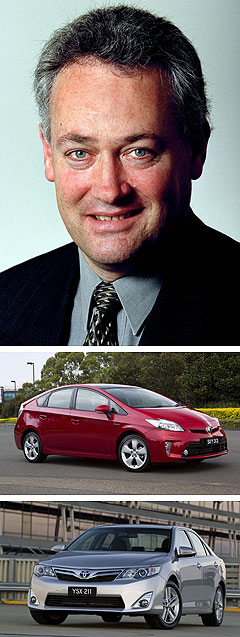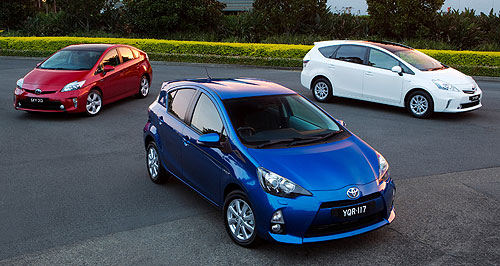News - ToyotaWhy Australians don’t like hybridsNew entrant: Toyota Australia expects the sharply-priced Prius C to help grow sales of its hybrid line-up. Hybrids on a ‘tipping point’ in Oz until more brands join electrification race29 Mar 2012 TOYOTA says it remains committed to hybrid vehicles despite lower than expected consumer take-up of its petrol-electric Hybrid Synergy Drive technology in Australia. Speaking at this week’s launch of the Prius C, Toyota Australia divisional manager Peter McGregor admitted that local hybrid sales had fallen well short of expectations. “I do acknowledge that it has been a little longer coming than we originally hoped for and anticipated, but in true Toyota spirit we don’t give up,” he said.. Mr McGregor said the launch of the new Camry Hybrid, all-new Prius C and facelifted Prius this month, plus the all-new seven-seat Prius V people-mover in May, would lift Toyota’s hybrid sales this year. “I think you can realistically expect to see hybrid volumes increase this year, with the activity that Toyota has put in place with a facelifted Prius, new-generation Prius C as an all-new model and Prius V to follow in a couple of months – not to mention the outstanding new Camry Hybrid. “The arrival of these four ground-breaking Toyota cars means that 2012 is shaping up as the year of the hybrid. The expanding family of hybrid vehicles is an example of foresight, investment and commitment.  Left: Toyota Australia divisional manager Peter McGregor. Below: Prius and Camry Hybrid. Left: Toyota Australia divisional manager Peter McGregor. Below: Prius and Camry Hybrid.“Toyota has no intention of losing its green credentials or ceding its leadership in this area. Hybrid is a vital part of our company’s future, and the future of the industry. “We’re pretty much on a tipping point. I have to say the product portfolio we’ve just announced and we’ll be launching in the first half of this year is an outstanding method to reignite interest in hybrid technology in this market.” Toyota said demand for the Prius C – which is sold in Australia and North America instead of the mechanically similar Yaris Hybrid - would exceed supply from its sole production base in Japan, but would not reveal how many it could sell in Australia given unlimited availability. Mr McGregor said Toyota Australia had secured enough supplies to sell just 1200 examples of the Prius C - which undercuts Honda’s $29,990 Insight to become the nation’s most affordable hybrid at $23,990 - and only 1000 Prius vehicles this year. “At this stage I’d have to say (we will sell) as many as we can get from Japan. At a price of $23,990 we are very confident.” Despite making hybrid technology more accessible than ever, at 1200 units this year the Prius C will only be marginally more popular than the regular Prius, which at 1000 sales will be well down on its annual high of 3413 in 2008. This week Toyota slashed the Prius price by $1000 to $33,990 following a 49 per cent 2011 sales slump to just 822 vehicles - less than a fifth of the 4500 annual sales it predicted when the MkIII Prius was launched here in July 2009 – despite a $5000 price cut last April. Mr McGregor admitted some Prius C sales would come at the expense of both the Yaris upon which it is based, and the Corolla, but said sales cannibalisation would be minimal. “I think there’s always an element of substitution and Yaris and Corolla are very popular in their various segments. We haven’t dimensioned the level of that substitution, so we think it will be quite minor but of course there will be some.’ He said Toyota believes the relative popularity of hybrid cars in Australia would increase as new hybrid entrants arrived from other brands. “I think maybe one of the reasons why hybrid has not fulfilled its destiny yet is because we’ve almost been a lone voice with Hybrid Synergy Drive and hybrid technology. “If you look at some of the recent motor shows around the world a number of our competitors are announcing significant hybrid initiatives which, given the openness of our market and the competitiveness of our market, will certainly flow into our market and I think if that happens we’ll reach that point more quickly.” In the US, both the Hyundai Sonata and mechanically identical Kia Optima are available with hybrid power, while most luxury brands also offer a number of hybrid models. Earlier this year Toyota’s premium brand, luxury hybrid pioneer Lexus, welcomed news that BMW will join it and Porsche in Australia’s fledgling prestige petrol-electric segment when it launches the 5 Series hybrid by mid-year. While Honda is the only other mainstream brand to offer hybrid vehicles in Australia, a range of others are expected to do so within the next year or so, including Holden, Mazda, Mitsubishi, Peugeot and Volvo. The Japanese giant has sold about 2.5 million Prius models globally in almost 15 years, but just over 17,000 Australian sales in more than a decade represents a tiny fraction of that. Australia’s hybrid take-up rate is far greater among non-private buyers including business, government and rental fleet purchasers, who last year bought 219,693 petrol cars and 24,814 diesels, but 6002 hybrid car sales was a 15 per cent decline on the previous year. Of nearly 300,000 Australian individuals that bought passenger cars that year, some 285,026 purchased petrol models, while 19,908 bought diesels and just 2212 opted for a hybrid – up 25 per cent on 2010. Australia’s top-selling vehicle brand admitted at the Camry Hybrid launch earlier this month that it would take “a while” for the locally built hybrid model to achieve the 10,000-unit annual sales rate it forecast when the previous generation went on sale in February 2010. However, Toyota expects the cashed-up, tech-savvy children of the baby-boomer generation, Gen Y, to play a big role in the emergence of hybrid cars in Australia soon. “Our local research has shown that, apart from the innovators and early adopters who embrace hybrids, it is younger people – particularly Gen Y – who really understand hybrid technology and appreciate its benefits,” said Mr McGregor. “They tend to view hybrid technology as proven and reliable, and they’re generally willing to pay extra to get the fuel-saving benefits. Toyota says Gen Y numbers around five million strong in Australia, accounting for more than 20 per cent of the population, and is predicted to purchase 40 per cent of all new cars sold here with 10 years. It said the local findings are supported by the results of annual surveys conducted by Deloitte among Gen Y consumers in the US, China and Europe. “The 2011 survey results, released last month, found that Gen Y consumers have a strong affinity for hybrid vehicles. So much so, that Deloitte believes the Gen Y preference for hybrids could represent a tipping point in the mass adoption of alternative powertrains. “Gen Y could be the generation that leads us away from traditional petrol-powered cars.”  Read more |
Click to shareToyota articlesResearch Toyota Motor industry news |
















Facebook Twitter Instagram